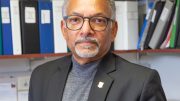The University of Manitoba continues to participate in Truth and Reconciliation Commission discussions.
A discussion series entitled “Critical Conversations on Indian Residential Schools, Truth and Reconciliation,” is being held at the U of M throughout the 2010-11 school year.
“Its mandate is to create the best possible archive it can on stories from survivors, and to give survivors an opportunity to talk about their experiences,” said Karen Busby, a professor in the faculty of law at the
U of M and a co-organizer of the series.
The Truth and Reconciliation Commission of Canada was born out of a settlement agreement in 2007 between the governments, churches, and survivors of Indian Residential Schools (IRS), explained Busby. The commission will now have its home in Winnipeg for the next four years.
In addition, the commission seeks to work on the conditions that lead to reconciliation between Aboriginal Peoples and the rest of Canada, she explained.
The mandate of discussion series is to generate meaningful conversations in the hopes of greater understanding, as TRC acts as a means to move forward from the time of Indian Residential Schools, said Busby.
According to Busby, much of the work done by researchers at the University of Manitoba is related to either the consequences of Indian Residential Schools, or more generally, to reconciliation issues. The series will thus showcase presenters from within the university
community.
The TRC in Winnipeg is also undergoing a statement gathering project in collaboration with other centres such as the Mauro Centre, the
Centre for Creative Writing and Oral Culture as well as RESOLVE, an anti-violence research network.
RESOLVE has set up two offices in downtown Winnipeg where survivors can go to make formal statements. The pilot project will facilitate the greatest collection of statements possible in order to create an archive of stories from survivors who come forth.
“It is estimated that there are 80,000 residential school survivors. [ . . . ] They’re just guessing that 20,000 would want to make a statement about their experiences,” she said. “There’s no way that commissioners can listen to every person who wants to speak.”
Busby said making statements can be very important to people who want to record their stories.
“It can be very personal to individuals, for some people it’s just cathartic to talk about what happened,” she said.
The university is contributing to the archiving process by providing student interns from the history department to help collect, transcribe and organize the statements. The U of M is also providing archive storage space. Busby said the U of M is probably one of the only universities in Canada involved in such a large way.
She hopes once the project is evaluated, it can be expanded across the country and eventually become a national archive, so all Canadians will be engaged in such conversations.
“We know that Aboriginal Peoples are the most marginalized of groups in Canada, so hopefully the TRC process allows Aboriginal and non-Aboriginal Peoples to engage in conversation about how to better live together,” she said.
Busby said the series will cover a broad range of topics, from the success of TRCs in other countries to the politics of reconciliation, to cultural representation of the Indian Residential School.
Sherry Farrell Racette, a professor of native studies and women’s studies at the U of M, was invited to be a panelist for one of the discussions on the contribution of visual artists.
Racette said that there are a lot of aboriginal artists whose work is deeply rooted in historical experiences, and explained that art is on the frontlines of bringing issues forward.
“Going through the eyes is a different way of getting people to listen to you,” she said.
Racette said that the emergence of work by artists and writers predates the court cases and hearings.
“When people started making artwork about this issue it parallels the emergence of the struggle to have the whole residential school issue recognized,” she said.
“Reconciliation isn’t just a one-way conversation and I think that art gives us a way to communicate those deep feelings”
Andrew Woolford, a professor of sociology at the U of M, is supervising six graduate students who are attending the TRC as part of a sociology course.
Woolford said attending the series gives the students an opportunity to meet people with expertise and to have people who are currently investigating the topics act as professors.
“I think there needs to be a lot of education about the TRC amongst the student population,” said Woolford. “Certainly my own interaction with students here is that people aren’t aware and this is something major happening in our country and within our city.”
The series is open to the public and will be spread out throughout the year, with an hour and a half sessions occurring biweekly.





Where are these critical conversations and when?